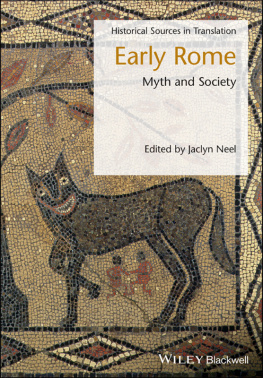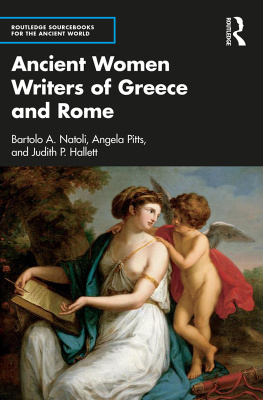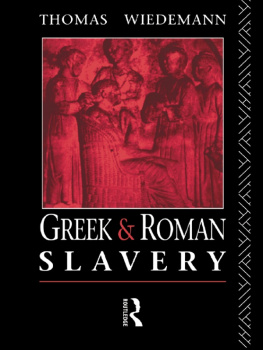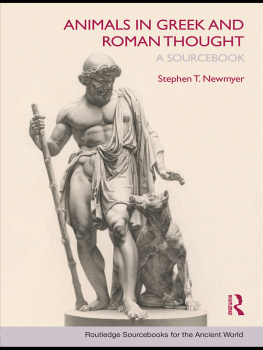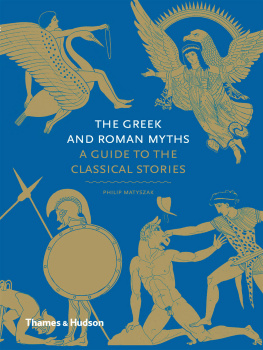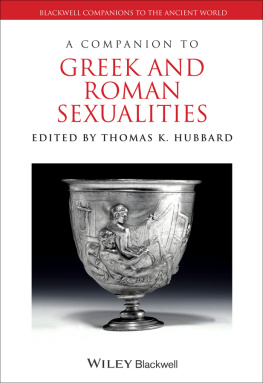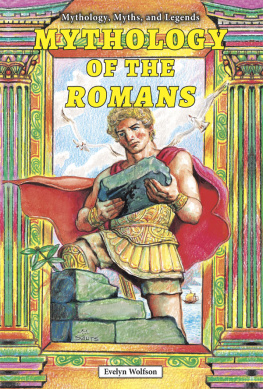
Blackwell Sourcebooks in Ancient History
This series presents readers with new translations of the raw material of ancient history. It provides direct access to the ancient world, from wars and power politics to daily life and entertainment, allowing readers to discover the extraordinary diversity of ancient societies.
Published
The Ancient Near East
Edited by Mark W. Chavalas
The Roman Games
Alison Futrell
Alexander the Great
Waldemar Heckel and J. C. Yardley
The Hellenistic Period
Roger Bagnall and Peter Derow
Ancient Greek Religion
Emily Kearns
Ancient Greece from Homer to Alexander
Joseph Roisman and J. C. Yardley
Early Rome: Myth and Society
Jaclyn Neel
This edition first published 2017
2017 John Wiley & Sons Inc
All rights reserved. No part of this publication may be reproduced, stored in a retrieval system, or transmitted, in any form or by any means, electronic, mechanical, photocopying, recording or otherwise, except as permitted by law.Advice on how to obtain permision to reuse material from this title is available at http://www.wiley.com/go/permissions.
The right of Jaclyn Neel to be identified as the author of this work has been asserted in accordance with law.
Registered Offices
John Wiley & Sons, Inc., 111 River Street, Hoboken, NJ 07030, USA
Editorial Office
350 Main Street, Malden, MA 02148-5020, USA
For details of our global editorial offices, customer services, and more information about Wiley products visit us at www.wiley.com.
Wiley also publishes its books in a variety of electronic formats and by print-on-demand. Some content that appears in standard print versions of this book may not be available in other formats.
Limit of Liability/Disclaimer of Warranty: While the publisher and author have used their best efforts in preparing this book, they make no representations or warranties with respect to the accuracy or completeness of the contents of this book and specifically disclaim any implied warranties of merchantability or fitness for a particular purpose. It is sold on the understanding that the publisher is not engaged in rendering professional services and neither the publisher nor the authors shall be liable for damages arising herefrom. If professional advice or other expert assistance is required, the services of a competent professional should be sought.
Library of Congress Cataloging-in-Publication Data applied for.
Hardback: 9781119083795
Paperback: 9781119083801
Cover image: Wolf Mosaic, Aldborough Roman Town, Yorkshire, 300 AD (mosaic) / Leeds Museums and Art Galleries (Leeds City Museum) UK / Bridgeman Images
For my parents
The scholarly community has become increasingly aware of the differences between Roman myths and the more familiar myths of Greece. Early Rome: Myth and Society steps in to provide much-needed modern and accessible translations and commentaries on Italian legends.
This work examines the tales of Roman pre- and legendary history, discusses relevant cultural and contextual information, and presents author biographies. This book offers updated translations of key texts, including authors who are often absent from classical mythology textbooks, such as Dionysius of Halicarnassus and Servius. Editor Jaclyn Neel debunks the idea that Romans were unimaginative copyists by spotlighting the vitality and flexibility of Italian myth -- particularly those parts that are less closely connected to Greek tales, such as the story of Caeculus of Praeneste. Finally, by calling attention to the Italian rather than Roman nature of the collection, this book suggests that Roman culture was broader than the city itself. This important work offers:
- Up-to-date and accessible translations of Roman and Italic legends from authors throughout antiquity
- Examination of compelling tales that involve the Roman equivalent of Greek heroes
- Unique view of the strength and plasticity of Roman and Italic myth, particularly the parts less closely connected to familiar Greek tales
- Intelligent discussion of relevant cultural and contextual information
- Argument that Roman culture reached far beyond the city of Rome
Fresh and readable, Early Rome: Myth and Society offers essential reading for students of ancient Rome as well as those interested in Roman and Greek mythology.
Jaclyn Neel is Assistant Professor of Instruction at Temple University, USA. She is the author of Legendary Rivals: Collegiality and Ambition in the Tales of Early Rome (2014) and several articles on Italic myth.
Preface
Students inspired me to write this book. I was teaching my first class on early Rome when I realized that the only translation of Dionysius was over 100 years old and so antiquated that the majority of the class simply refused to read it. After a few weeks, I couldn't blame them; I'd switched back to the Greek. I found myself skipping material that was interesting, but essentially unteachable: not only Dionysius, but also passages from Servius and other writers who lack any English translation.
This book cannot fill that gap, but I hope that it makes some progress in doing so by providing a selection of material that can be used to teach (or simply read) about early Rome. There is far more material than I've had space to provide, both textual and iconographic. Space restrictions inevitably mean that I've had to limit some authors (notably Dionysius and Plutarch) whose prose is more elaborate.
In selecting texts, I have tried to hew closely to two principles. The first is novelty: if two authors tell essentially the same story, and one of those two authors has a modern translation, I have translated the other. In doing so, I have omitted several of Rome's most famous authors almost entirely; this book contains little Vergil. But the world is so rich in translations of Vergil that I think the fault is forgivable. The other principle is variety: when many variants of a given tale exist, I have translated as many as possible. That has yielded a book whose organization is as imbalanced as surviving Roman narratives: there's far more Romulus than Numa, for example. Astute readers will notice that the variety diminishes in later chapters, again matching the character of the sources.
This book is intended for a rather disparate audience, ranging from advanced undergraduates to graduate students in non-classics fields. The explanatory material will doubtless be too detailed for some and not sufficient for others. I have assumed basic knowledge of Greek myth (e.g., the names of the gods and their major activities) and of Roman history (e.g., the identity of Julius Caesar). The chapters can be read in any order, although the organization is largely chronological. As a result, there's some repetition in the explanatory material between chapters, which I've tried to limit as much as possible. Within the chapters, the sources are organized chronologically.
The Further Reading sections aim to be accessible and cover a range of methods. Because the scholarship on early Rome is international, I've pointed to some important arguments in the ``Introductions'' but there is, of course, far more available. Advanced students will benefit from the additional bibliography maintained by Alain Meurant at the excellent Lupa Capitolina Electronica website (http://lupacap.fltr.ucl.ac.be/LCE.ang/default.htm). Instructors will want to supplement to suit their own aims; my plan was undertaken with Cornell's The Beginnings of Rome
Next page
